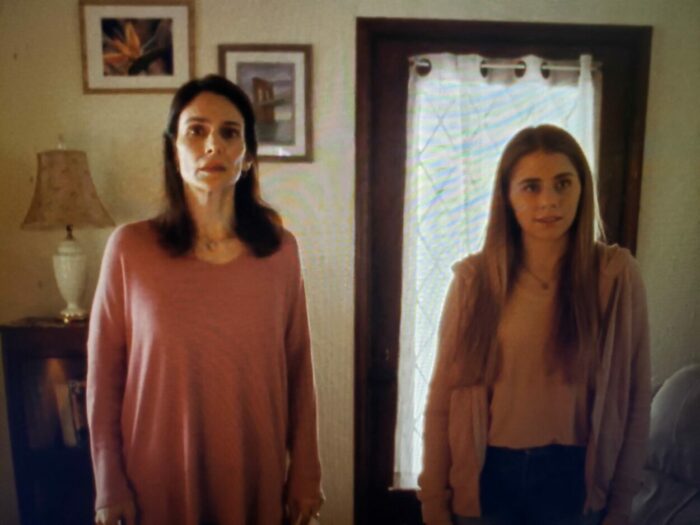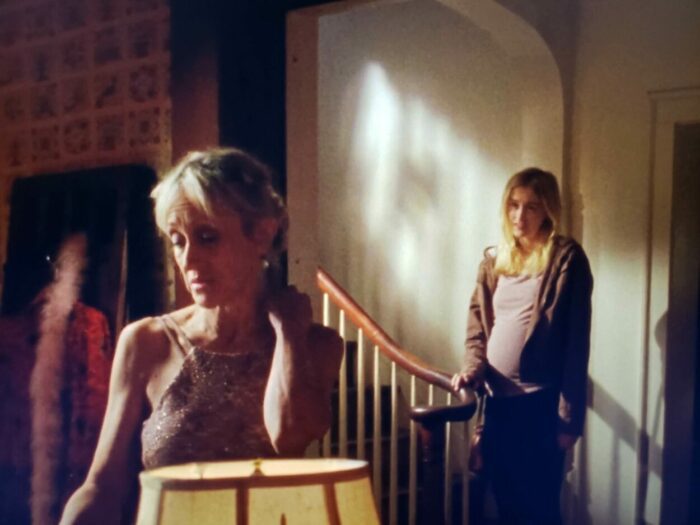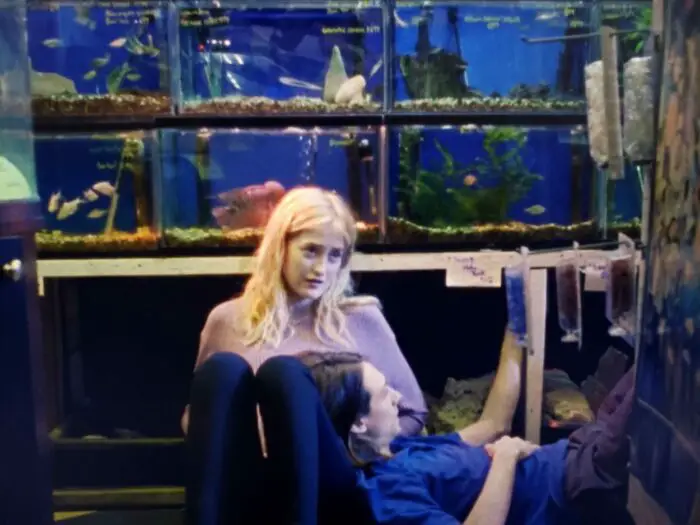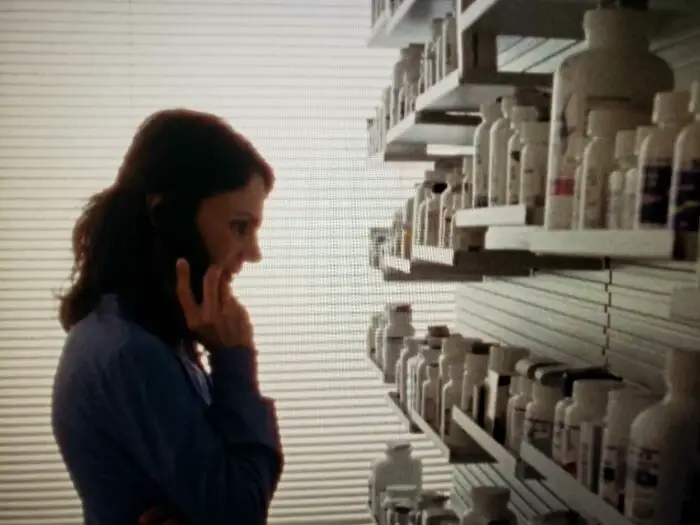Giving Birth to a Butterfly is a discourse waiting to happen. Those who enjoy it will find the seeds for a lengthy discussion about myriad meanings within the film. Though these are hardly infinite, each easily branches into a variety of notions well worth considering. A 16mm fairytale of sorts, Giving Birth to a Butterfly is a movie about letting go. What that means, however, is up to the audience.
The story follows Annie Parisee as Diana, an unhappy pharmacist with an unpleasant personal life. The main distastefulness stems from the father of her children, Daryl (Paul Sparks), a dimwitted man-child prone to throwing temper tantrums. We then meet Marlene. Played by Gus Birney, she’s the pregnant romantic partner of Diana’s son, Drew, portrayed by Owen Campbell. Not exactly pleased by this situation, Diana soon finds something much more troubling to contend with. Someone recently drained her bank account. Marlene becomes the only person who can help her quietly investigate the mysterious theft, and the two embark on a revelatory road trip.

Like a lot of plots, Giving Birth to a Butterfly may not sound too compelling on paper. It’s the way the story unfolds that gives the film its appeal. Particularly worth noting are the fantastic performances given by the cast.
During the dinner scene where Marlene meets the family, Diana’s displeasure, with Daryl and her son’s situation, can all be gleaned from Annie Parisee’s delivery and facial expressions. So much of her character is revealed in brief looks and dialogue which adds to this without being expository. Paul Sparks as Daryl is obnoxiously oblivious to her obvious discontent, yet there’s room to argue at least he’s thrilled. What this scene does well is show the absolute disconnect between the two, a strength seen throughout Giving Birth to a Butterfly.
Characters are often at odds with one another for similar reasons. Mainly this tends to be due to a recurring theme of self-delusion. People in the movie want to live in their comforting bubble even if it means ignoring reality around them. Nowhere is this clearer or more heartbreaking than Constance Shulman’s portrayal of Monica.
It’s hard to explain without giving away too many details. With a runtime of around an hour and seventeen minutes, any spoilers risk ripping out huge chunks from Giving Birth to a Butterfly. This can lessen the impact of certain discoveries. Suffice it to say, Monica has never stopped acting, and this becomes a metaphor implicating everyone in the film.

The notion that all people are main characters in their own lives is another topic throughout the movie. It’s worth mentioning here because director Theodore Schaefer is able to play with some of these and other philosophical notions cinematically. During one revealing monologue the camera gradually pans away to show other people doing things entirely unrelated to the events of the film or the spoken lines. This is a marvelously subtle way of reminding the audience that other lives with their own main plots are also occurring.
That’s not to say the film is always this subtle. Some lines of dialogue are so on the nose they break it. Then there are the repeated shots of a fish in its tank which start to feel like filler. As do the seemingly obligatory indie trope of prolonged nature shots. However, Giving Birth to a Butterfly never feels aimless.
Terms like Lynchian have been used to describe the movie. These may not be entirely accurate. Though the latter portion does seem to partially justify such labeling, it pigeonholes the film as well as creates expectations it won’t live up to. Even director Theodore Schaefer seems to prefer crediting the likes of “Aki Kaurismäki, Chantal Akerman, Jim Jarmusch and the patient Edward Yang much more than Lynch or anyone else.”

There’s an interestingly mournful optimism to Giving Birth to a Butterfly. Even a dislikeable character such as Daryl is eventually revealed to be almost tragic. This is thanks in no small part to another scene featuring well-acted dialogue between Paul Sparks and Rachel Resheff who plays daughter Danielle. It’s not just what he reveals about his own quiet desperation but the way he ruins whatever pity he elicits from the audience.
Giving Birth to a Butterfly opens with an excerpt from “Love Songs” (a.k.a. “Songs to Joannes”) a collection of poetry by Mina Loy. Besides revealing the source of the title, it sets up a lot of what’s to come. And I think the movie can be partially understood through another Mina Loy quote.
In her posthumously published “Feminist Manifesto” she wrote, “Women if you want to realize yourselves… all your pet delusions must be unmasked… there is no half measure — no scratching at the surface… the only method is Absolute Demolition.”

Giving Birth to a Butterfly is a soft sledgehammer. Yet, it’s no less effective than a hard blow. Whereas most other fairytales teach people to endure harsh realities, find a way to slap the dragon burning one’s life, this film offers the option of letting go. Escape without violence from a world of quiet madness. Although the dialogue can sometimes feel like it’s trying too hard to have deeper meaning, or being all too intentionally weird, especially when Judith Roberts arrives, superb performances carry the movie over these hurdles.
Fans of artsy indie films should catch a viewing. Others may let it fly by, though its length makes Giving Birth to a Butterfly a minor sacrifice. And to paraphrase some sage advice I once heard, it could seed some future conversation that leads to an honest connection.



